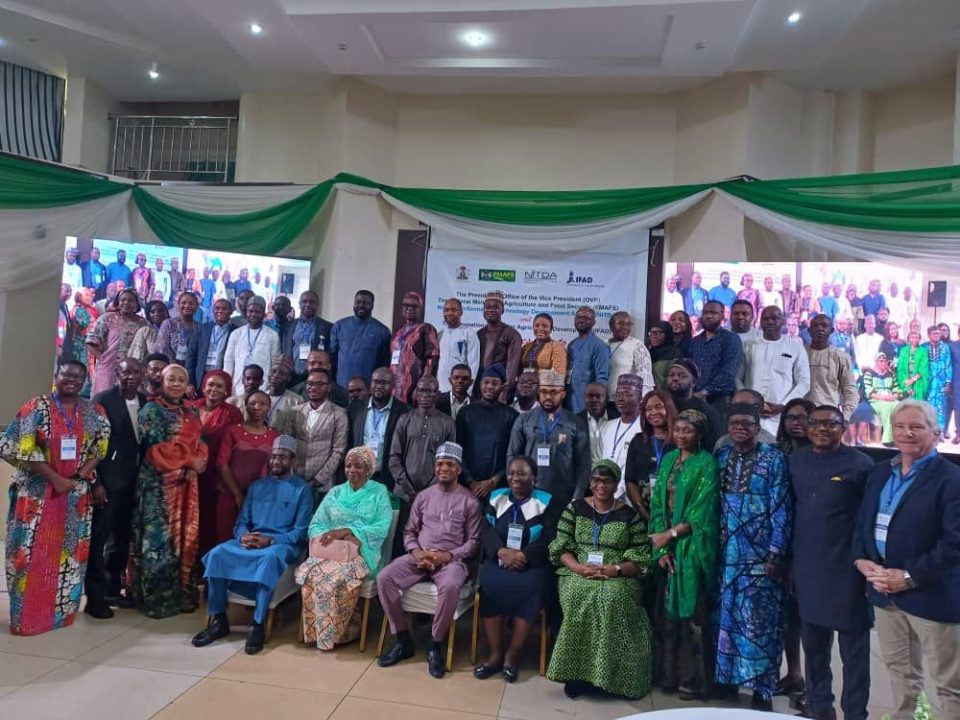The Senior Special Assistant to the President on Agribusiness and Productivity, Dr Kingsley Uzoma, has reiterated President Tinubu’s commitment to ensure transformative change in Nigeria’s agricultural sector.
Speaking at the National Policy Dialogue on Deepening Partnership for Scale-Up of ICT4D for Smallholder Farmers in Nigeria organised by the Federal Government in collaboration with the International Fund for Agricultural Development he said “We are at a critical phase in our country’s history, especially against the backdrop of the challenges with the Agriculture, Agribusiness and Food Security sector.
“Nigeria has the second highest rate of stunted children in the world, 70% of Nigerians live below the poverty line, food inflation stood at 31.52% in October, 88.5 million Nigerians are currently faced with insufficient food consumption and an increase of over 6 million people is projected in the coming months.
“Compounding this issue is the critical state of food security in Nigeria. The decline in agricultural capacity has been a major contributor, forcing the country to heavily rely on food imports. Between 2019 and 2023, there has been an alarming surge of over 80% in food importation. This escalating dependence on external sources further intensifies the challenges within the domestic food landscape all of which have resulted in the declaration of a state of emergency in food security by Mr President.
“The International Fund for Agricultural Development and indeed the United Nations system have a long history of collaboration with the Nigerian government and people towards advancing shared objectives and development goals particularly Zero Hunger (SDG 2) and this is why this National Policy Dialogue on Deepening Partnership for Scale-Up of ICT4D for Smallholder Farmers in Nigeria) is important because it promotes valuable knowledge sharing, facilitates partnership across board and places the right degree of emphasis on the role of technology in developing sustainable agriculture.
“IFAD-financed programs, such as the Value Chain Development Programme (VCDP) and Livelihood Improvement Family Enterprises Project for the Niger Delta (LIFE-ND), aim to enhance incomes and food security through sustainable agricultural practices and the integration of Information and Communication Technology for Development (ICT4D) in these programs involving tools such as the Mini-weather Station (Nimet) and Agriculture Market Information System (AMIS) to benefit farmers. However, challenges in data access, gender equality, infrastructure and technical support still exist.”
Speaking further, he said “These outcomes are perfectly aligned with the mandate of the Senior Special Assistant to the President on Agribusiness and Productivity Enhancement (SSAP) under the able, intentional and consistent leadership of the Vice President of the Federal Republic of Nigeria, which encompasses a multifaceted approach rooted in technology and innovation to ensure transformative change in Nigeria’s agricultural sector.
“This includes empowering 1,000,000 women, youths, and minorities to achieve food and nutritional sovereignty, ensuring food security and heightened agricultural productivity, achieve a $22 billion import substitution of high-value crops like wheat, implement sustainable agricultural practices to promote environmental conservation and mitigate climate change. Moreover, the mandate seeks to generate 2 million direct and 6 million indirect jobs, with a focus on youth and women, while simultaneously addressing and minimizing farmer/herder crises.”
However, the Presidential Initiative for Agribusiness Development (PIFAD) represents the platform through which the Federal Government, development partners and the private sector are able to collaborate and contribute to the growth of the agribusiness landscape, driving growth across the value chain.
Listing the nine core pillars of PIFAD as: Wheat Development Program, Green Imperative Project – GIP, Family Farm Support Program – (Family Farm), National Livestock Transformation Plan- NLTP, Climate-Smart Agricultural Program, Commodity Exchange, Irrigate Nigeria Project, Special Agricultural Industrial Processing Zones (SAPZ), Renewable Energy Agribusiness Program (REAP).

